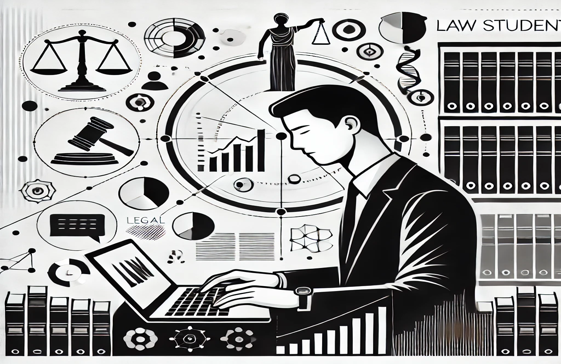
Artificial intelligence (AI) is making significant waves in the legal world, and for law students, this shift brings exciting possibilities as well as formidable challenges. The technology has the potential to transform how legal research is conducted, how lawyers interact with clients, and even how court cases are managed. However, while AI can be a game-changer, it also raises serious ethical questions. For law students, understanding these issues is crucial for preparing to work in a legal landscape that is rapidly evolving.
How AI Could Help the Next Generation of Lawyers
AI tools can provide substantial assistance for law students and young lawyers by making certain tasks more efficient. For example, AI can expedite legal research, draft documents, and assist in organizing large volumes of documents. This means that lawyers can spend less time on repetitive tasks and more time focusing on trial strategy, client communication, and solving complex legal problems.
Furthermore, AI has the potential to make legal services more accessible to individuals who cannot afford a lawyer. With AI-driven tools, routine tasks such as drafting a will, filing for divorce, or understanding basic legal rights could be made more affordable and straightforward. This could provide more individuals with the opportunity to obtain legal assistance, even if they are facing financial challenges.
The Downsides: Ethical Issues with Using AI in Law School and Beyond
While AI offers numerous benefits, it also introduces significant ethical concerns, particularly for law students who are still in the process of learning foundational skills. As AI tools become more prevalent in law schools, there is a risk that students might begin to rely too heavily on them for activities such as studying, writing papers, and preparing for exams. This could be problematic when transitioning from the classroom to the real world, where AI tools cannot replace a deep understanding of legal concepts.
If law students rely excessively on AI to complete their work, they may not develop the skills necessary for practicing law effectively. Many AI tools use complex algorithms to generate their answers, but they do not always explain how they arrived at their conclusions. If students become accustomed to merely accepting AI's solutions, they may not learn how to thoroughly analyze legal issues on their own. The ability to think critically, craft persuasive legal arguments, and understand the reasoning behind legal principles will become weakened if students depend too heavily on AI.
There is also a risk that students could internalize errors or oversimplified explanations from AI tools. Law school is intended to help students learn how to think deeply about legal problems and their solutions, rather than simply relying on software to do the thinking for them. If AI tools are overused, students may not be adequately prepared for the complex situations they will encounter in real legal practice.
The Need for Transparency with AI Tools
Another concern is that many AI programs do not disclose precisely how they generate their results. This "black box" nature can be a problem in law, where the ability to explain decisions clearly is essential. Law students must learn to question the information provided by AI, understanding its limitations and not simply accepting it at face value.
In addition, the lack of transparency in AI systems raises concerns about accountability with respect to the work product. In the legal field, where precision and justifications are essential, it is not sufficient to know that an AI tool provided an answer—lawyers and students must understand why it provided that specific response. Without clarity regarding the decision-making process, it is difficult to assess whether an AI-generated outcome is based on sound legal principles or flawed data. This opacity can undermine trust in AI tools and poses a risk for legal professionals who must be able to justify their decisions to courts, clients, and regulatory bodies. For law students, learning to scrutinize and validate AI-generated information should be used to help develop critical thinking skills that are fundamental for practicing law, rather than replacing them.
The Future of AI in Law: Embracing Technology while Staying Ethical
As future lawyers, today's law students must be prepared to use AI in their work, but they must also be aware of the risks. AI will likely become a standard part of many legal tasks, from reviewing contracts to predicting case outcomes. However, it is important for young lawyers to remain mindful of the ethical issues AI presents, such as bias or unfair outcomes that could result from AI systems trained on flawed data.
Law schools can assist by offering courses that teach not only how to use legal technology, but also how to think critically about its ethical use. This would help bridge the gap between what students learn in school and what they will need to know in the real world, allowing them to use AI responsibly and effectively.
Conclusion
For law students, AI is both an exciting opportunity and a serious challenge. It can make legal work more efficient and accessible, but it also comes with risks that must be carefully managed. The key is to strike a balance between leveraging new technology and maintaining the high standards of the legal profession. By learning to use AI tools critically and understanding their limitations, students can be better prepared to shape the future of law in a manner that is both fair and ethical.
If you would like to learn more the following is a link to the University of Missouri Kansas City’s webinar on this topic.
UMKC Generative AI and Ethics Webinar
Sources
Legal Ethics in the Use of Artificial Intelligence – Squire Patton Boggs
Ethics of AI in the Practice of Law – Thomson Reuters Legal Solutions
AI and Law: What are the Ethical Considerations? – Clio
The Impact of AI on Legal Education – Legaltech News
